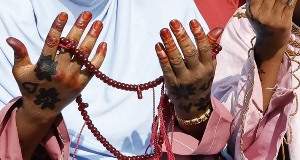Animal fables have primordial origin and been told to import some moral lessons to guide mankind in our hodienal activities and transactions. George Orwell’s Animal Farm and Geoffrey Chaucer’s Chanticleer and Petelote are perfect few examples amongst many. These create humour and suspense in our story-telling cultures and the cat, amongst the feline family has always been mentioned in fables as a threat to especially mice. As to what linguistic expression the animals used to communicate, that remains a story told. Aesop, the ancient slave poet and story-teller of Nubian extraction who lived in Greece between 620 and 560 BC told approximately 655 fables. Many of them were animal fables of world-wide use and recognition, some of which I read in primary school and out of which I have selected two for the purpose of this script. Cats have not only been featured in fables from ancient times but also have used in allegories and in paroemia as in the Dr Kwabena Adjei saga.
It may be recalled that in August 2010, the NDC Chairman, Dr Kwabena Adjei apparently over-shot himself in a radio interview relating to the NDC and the Mills’ administration’s intention to interfere with the work of the judiciary by stating that there are many ways of killing the cat which raised serious concerns. Old wives’ tale, has it that if a dying cat identifies its killer in articulo mortis, it summons the soul of its killer to hades so they would also die shortly afterwards. This superstition has held sway for several millennia so cat killers like Dr Kwabena Adjei would choose either of many safe ways known only to themselves. The true fact behind this superstition is that, a cat on attack has the agility to execution with mortiferous consequences if extreme care is not taken, hence the many ways of killing the cat catch phrase in allegorical expressions. As to why Dr Kwabena Adjei used a cat killing technique in his innuendo referring to NDC’s dissatisfaction with Ghana’s judiciary has very far reaching consequences. Kwabena Adjei’s cat-killing allegory can be a realistic insinuation with Ghanaian Judges which is far from anything humourous and gelastic, but an issue to be taken serious as it could be tragic. I am not advocating ahimsa in respect of actual cat-killing; that not-withstanding, why does he suggest killing the cat in the first place even in insinuation? Secondly, how safe does he think he can go on with cat-killing spree in today’s Ghana?
Aesop’s fable concerns a group of mice who debate plans to nullify the threat of a marauding cat. One of them proposes placing a bell around its neck, so that they could hear its approach so that they could take cover. The plan is applauded by the others but an old-aged mouse asks who will volunteer to place the bell round the cat’s neck. All then make excuses. The story is used to teach the wisdom of evaluating a plan not only on how desirable the outcome would be, but also on how it can be executed. It provides a moral lesson about the fundamental difference between ideas and their feasibility, and how this affects the value of a given plan. The story gives rise to the idiom to bell the cat, which means to attempt, or agree to perform, an impossibly difficult task. In Kwabena Adjei’s killing the cat-mania, is it to be taken for a humourous impossibility as in Aesop’s version of belling the cat? What moral lesion do we learn from killing the cat? Historically belling the cat became the basis of the nickname given the Scottish nobleman, Archibald Douglas, 5th Earl of Angus. In 1482, at a meeting of nobles who wanted to depose and hang James III's favourite, Robert Cochrane, Lord Gray remarked, Tis well said, but who dares bell the cat? The challenge was accepted and successfully accomplished by the Earl of Angus. In recognition of this, he was always known afterwards as Archie Bell-the-cat
The author concludes with the scornful comment that laws are of no effect without the means of adequately enforcing them and that such parliamentary assemblies as he describes are like the proverbial mountain in labour that gives birth to a mouse.
The fable also appeared as a cautionary tale in Boson’s Anglo-Norman Contes Moralisés, referring to the difficulty of curbing the outrages of superior lords. It was in this context too that the story of a parliament of rats and mice was retold in William Langland's allegorical poem Piers Plowman. The episode is said to refer to the Parliament of 1376 which attempted unsuccessfully to remedy popular dissatisfaction over the exactions made by nobles acting in the Royal name
Good counsel's easily given, but its execution and effect often renders it uneasy to transact; similarly and conversely, bad counsel like that of Kwabena Adjei can be recklessly given and executed, unmindful of its consequences. In June 1982 a plot was hatched by Kojo Tsikata with Jerry John Rawlings to eliminate some Ghanaian judges whom they begrudged for sitting in judgement on their inchoate offences. In playing the role of the Earl of Angus, Amartey Quaye, Tekpor and Amedeka found it an easy job to execute the plot with dire consequences which they lived to regret before their scape-goat public execution. The plotters themselves escaped prosecution as accomplices and inciters because Quaye and his gang were promised ‘deus ex machina’ if they took all the blame and did not include John Rawlings and Tsikata as the plotters.
Nobody forbids the use of allegory in expressions of any kind in whatever situation and circumstance because they serve as the broth that makes the food more savoury. It is clear that in mediaeval times the cat and mouse fable was applied to political situations and that, commentaries on it were sharply critical of the limited democratic processes of the day and their ability to resolve social conflict when class interests were at stake. This applies equally to a plot against the king's favourite in 15th century Scotland and the direct means that Archibald Douglas chose to resolve the issue. While none of the authors who used the fable actually incited revolution, it will be noted that the 1376 Parliament that Langland satirised was followed by Watt Tyler's revolt five years later and that Archibald Douglas went on to lead a rebellion against King James. In the meantime, the fangs of the fable were being drawn by European authors, who restricted their criticism to pusillanimous conduct in the face of rashly proposed solutions. There still remains the perception of a fundamental opposition between consensus and individualism. As the saying goes, there is no wise person who has never been fooled and also no fool who has never behaved wisely. If Ghanaians were naïve 29 years ago, 29 years later, Ghanaians have woken up to smell coffee and dastardy must be deemed a thing of the past. Usually as in the words of Aristotle, no notice is taken of a little evil until it grows to strike the eye. The fable below also written by the gracious Aesop is specifically directed to animadvert to Kwabena Adjei and his NDC murder gang that Ghanaians have been equally counselled by our mum because no excellent soul is exempt from a mixture of madness.
The Greek version of the fable recorded by Babrius concerns a cat that pretends to be a sack hanging from a peg in order to deceive the chicken, but his disguise is seen through by a rooster. The chickens hold a council and decide to stay off the floor and keep in the rafters. The cat then hangs himself this time from a hook and pretends to be dead to deceive the mice, but the mice are not deceived this time. The moral lesson taught by these stories is summed up by the English proverb 'Once bitten, twice shy'.
John Mills’ appointed DCEs have been known to taken to their heels, the disgraced Ashanti Regional Minister Mr Opoku Manu did flee discalced at Efiduase from the very venom that he had spewed. We expect our leaders and elders to be ‘Solomonic’, to talk like sages with good moral tinge as do others we call as wise men but not to talk reckless balderdash; to be prudent and not ‘Quixotic’ in their reasoning and approach to national issues that they may be perceived as reasonable and responsible honourable leaders. The fleeing must serve as enough premonitions for those who think evil in our modern Ghanaian political climate. Kwabena Adjei and his complicities may dare killing the cats and Egypt may descend on Ghana.
Adr?ba Kwaku Abrefa Damoa, LLB; MPhil (London) London UK
Opinions of Wednesday, 9 February 2011
Columnist: Damoa, Adreba Kwaku Abrefa














